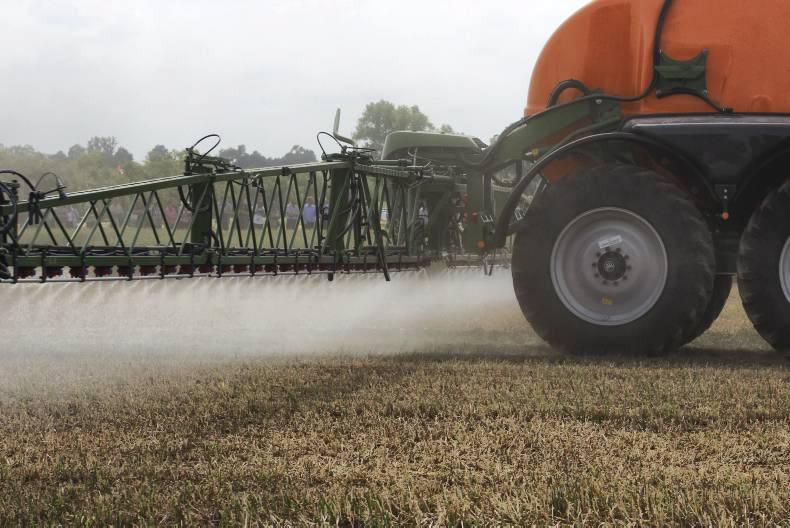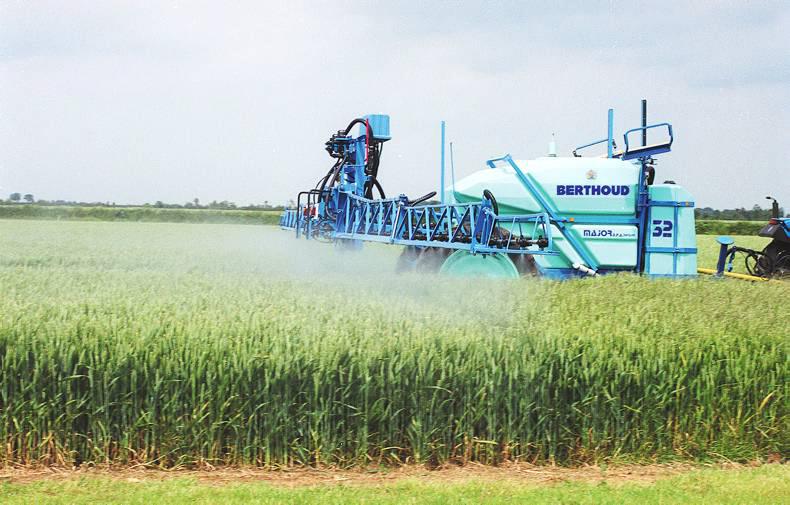New pesticide legislation is just one of the many elements of change being imposed on farmers in 2015. This has received considerable publicity in the tillage sector because these farmers depend on the availability and successful application of plant protection products for their livelihood.
Under the Sustainable Use Directive (commonly referred to as SUD) brought into law in 2009, all EU member states are obliged to implement a range of new requirements relating to pesticides. These relate to the selling of such products, the use of aerial spraying, the protection of water, a reduction in pesticide use, integrated pest management and the handling and storage of pesticides.
To do this, each member state was obliged to:
Produce and introduce a national action plan that was agreeable to the Commission.Have official training for those involved in different parts of the application and distribution chains.Introduce obligatory sprayer testing.These obligations were introduced into Irish law in 2012 and different elements are being introduced on a phased basis. The new legislation calls for the registration of all persons providing advice on pesticide use to farmers and this register was established in November 2013.
Only those on this register are allowed to provide such advice. Registered advisers must be present at all premises selling plant protection products. All pesticide distributors are also required to be registered by 26 November 2015, but this is a separate register to the advisers.
Professional users
The next phase of these requirements involves what are officially called professional users. These are the people who operate the application equipment through which the bulk of professional use products are applied. All professional users must register with the Department. Details of how to do this can be found at www.pcs.agriculture.gov.ie/sud/ by clicking the “how to register as a professional user pesticides” tab.
If you have an existing online Basic Payment Scheme (BPS) application facility, you can register through your AgFood account. If you are not registered for online application, you can register at https://publicapps.agriculture.gov.ie/suds/welcome.jspx and fill in the form.
Professional users will include farmers, sprayer operators, contractors, landscapers, green keepers or anyone else who is applying chemicals that are deemed to be professional in nature and use. If those who apply sprays wish to continue to do so, they must register on the Department’s website before 26 November 2015, as described previously.
The reasoning behind the registration and training of professional users is to help protect sprayer operators, consumers and bystanders, and also to help protect our water.
Registration itself is not an onerous task, but the registration process necessitates that each individual have completed a basic training course in pesticide use.
Many farmers completed such courses on a voluntary basis back through the years and this will suffice as proof of such training, providing proof of participation can be furnished. Teagasc is working with farmers in this regard as about 14,000 farmers have already done such training in the past.
For those who do not have such proof, it is necessary to complete one of the current sprayer operator courses for professional users that are taking place around the country. These are being run by registered providers and a list of these is also available on the Department’s SUD webpage (shown above).
These courses are viewed in different ways by different people. Farmers who do a lot of spraying annually suggest the course could deliver more in terms of up-to-the-minute spraying advice, while farmers with relatively little sprayer activity (and of a certain age bracket) can find these courses onerous and difficult to cope with the language used by the course providers.
Spray residues
It is important for all sprayer operators to be conscious of the purpose of the legislation. The use of pesticides requires many crosschecks, with maximum levels set in the food produced and now levels in both surface and ground water are monitored for the presence of any pesticide.
The levels set are quite onerous and with sprayers considered as a major source of potential delivery of pesticide to water, it is not surprising that much of the current legislation focuses on sprayers and those who operate them.
The greatest risk to chemicals getting into water is associated with filling sprayers from and beside streams, careless discarding of empty containers, careless washing of sprayers or chemical containers, discarding of contaminated foil seals and straight chemical spills.
Many of these may seem innocuous in terms of the quantity involved, but one unwashed container foil can result in a failed surface water test for 30km of a stream that is 1m wide and 0.3m deep. It is might not seem like pollution, but that stream would fail an EU water purity test. That is what we must all strive to prevent.
Those who depend on sprays for the productivity of their crops will inevitably have a greater awareness of these obligations. But careless activity, such as allowing a boom to sweep in over an open drain, becomes a farm statistic regardless of who caused it. The presence of pesticides in water is a national issue and continuous offences will result in either constraints on the use of that product(s) or it could be banned from use.
For those who depend on sprays for their farming activity, whether to control diseases in crops or weeds in grassland, it is very important that every effort is made to prevent any chemical from getting into surface water or ground water.
So the actions of even one farmer are important to all others. This is a justifiable reason to raise the bar of application to help protect the future of those whose livelihoods are impacted by the availability of these products.
On the assumption that all users of agrochemicals would endeavour to prevent spills into water, the sprayer is the major focus to prevent movement of pesticide to water during spraying. This is a major part of the focus of the operator training courses.
All users must register
The obligation to register as a professional user applies to any person who uses or applies pesticides, no matter how little or how much. All registered users will be given a specific individual number and this will be required from the end of this year as part of a cross compliance inspection. While a training course is a requirement for initial registration, registered professional users will subsequently be required to engage in continuous professional education. However, this may not be too onerous and attention to technical bulletins and text alerts may suffice in this regard.
So if you want to be a legal user of pesticides in the future, you must register before 26 November 2015. Users can come on to the register after that date, but a more formal certified training process may be required.
So if you want to continue spraying, even if it’s only a few nettles or docks, you must register by this date. Cross compliance inspectors will know that you purchased chemicals and you must then account for where and how these products were applied.
Sprayer testing
One other element to this new legislation is the provision for the testing of all agricultural sprayers with a boom width of more than 3m and also all orchard sprayers. Certified test providers have been trained and a list of these is also on the SUD webpage.
A certificate and sticker will be provided for each sprayer which passes the test which must remain with the sprayer, even if it is sold. In future, cross compliance inspectors will check to see that sprayers used to apply pesticides have a current test certificate.
All boom sprayers wider than 3m and all orchard sprayers must be tested every five years and this must be repeated up to 2020. This testing interval will decrease after 2020 when the test will have to be repeated every three years thereafter. New sprayers will have to be tested at least once within five years of their purchase date, but this will decrease to three years after 2020. All sprayers requiring testing must have the first test completed before 26 November 2016.
Again, this requirement applies to all sprayers regardless of how little or how much spraying it does. It does not apply to knapsack sprayers. The testing requirement only applies to >3m boom and orchard sprayers for now. It is envisaged that all other types of pesticide application equipment – boom sprayers <3m, weed-wipers, weed-lickers, pellet applicators seed dressers etc – will also have to be tested in the future.
New pesticide legislation is just one of the many elements of change being imposed on farmers in 2015. This has received considerable publicity in the tillage sector because these farmers depend on the availability and successful application of plant protection products for their livelihood.
Under the Sustainable Use Directive (commonly referred to as SUD) brought into law in 2009, all EU member states are obliged to implement a range of new requirements relating to pesticides. These relate to the selling of such products, the use of aerial spraying, the protection of water, a reduction in pesticide use, integrated pest management and the handling and storage of pesticides.
To do this, each member state was obliged to:
Produce and introduce a national action plan that was agreeable to the Commission.Have official training for those involved in different parts of the application and distribution chains.Introduce obligatory sprayer testing.These obligations were introduced into Irish law in 2012 and different elements are being introduced on a phased basis. The new legislation calls for the registration of all persons providing advice on pesticide use to farmers and this register was established in November 2013.
Only those on this register are allowed to provide such advice. Registered advisers must be present at all premises selling plant protection products. All pesticide distributors are also required to be registered by 26 November 2015, but this is a separate register to the advisers.
Professional users
The next phase of these requirements involves what are officially called professional users. These are the people who operate the application equipment through which the bulk of professional use products are applied. All professional users must register with the Department. Details of how to do this can be found at www.pcs.agriculture.gov.ie/sud/ by clicking the “how to register as a professional user pesticides” tab.
If you have an existing online Basic Payment Scheme (BPS) application facility, you can register through your AgFood account. If you are not registered for online application, you can register at https://publicapps.agriculture.gov.ie/suds/welcome.jspx and fill in the form.
Professional users will include farmers, sprayer operators, contractors, landscapers, green keepers or anyone else who is applying chemicals that are deemed to be professional in nature and use. If those who apply sprays wish to continue to do so, they must register on the Department’s website before 26 November 2015, as described previously.
The reasoning behind the registration and training of professional users is to help protect sprayer operators, consumers and bystanders, and also to help protect our water.
Registration itself is not an onerous task, but the registration process necessitates that each individual have completed a basic training course in pesticide use.
Many farmers completed such courses on a voluntary basis back through the years and this will suffice as proof of such training, providing proof of participation can be furnished. Teagasc is working with farmers in this regard as about 14,000 farmers have already done such training in the past.
For those who do not have such proof, it is necessary to complete one of the current sprayer operator courses for professional users that are taking place around the country. These are being run by registered providers and a list of these is also available on the Department’s SUD webpage (shown above).
These courses are viewed in different ways by different people. Farmers who do a lot of spraying annually suggest the course could deliver more in terms of up-to-the-minute spraying advice, while farmers with relatively little sprayer activity (and of a certain age bracket) can find these courses onerous and difficult to cope with the language used by the course providers.
Spray residues
It is important for all sprayer operators to be conscious of the purpose of the legislation. The use of pesticides requires many crosschecks, with maximum levels set in the food produced and now levels in both surface and ground water are monitored for the presence of any pesticide.
The levels set are quite onerous and with sprayers considered as a major source of potential delivery of pesticide to water, it is not surprising that much of the current legislation focuses on sprayers and those who operate them.
The greatest risk to chemicals getting into water is associated with filling sprayers from and beside streams, careless discarding of empty containers, careless washing of sprayers or chemical containers, discarding of contaminated foil seals and straight chemical spills.
Many of these may seem innocuous in terms of the quantity involved, but one unwashed container foil can result in a failed surface water test for 30km of a stream that is 1m wide and 0.3m deep. It is might not seem like pollution, but that stream would fail an EU water purity test. That is what we must all strive to prevent.
Those who depend on sprays for the productivity of their crops will inevitably have a greater awareness of these obligations. But careless activity, such as allowing a boom to sweep in over an open drain, becomes a farm statistic regardless of who caused it. The presence of pesticides in water is a national issue and continuous offences will result in either constraints on the use of that product(s) or it could be banned from use.
For those who depend on sprays for their farming activity, whether to control diseases in crops or weeds in grassland, it is very important that every effort is made to prevent any chemical from getting into surface water or ground water.
So the actions of even one farmer are important to all others. This is a justifiable reason to raise the bar of application to help protect the future of those whose livelihoods are impacted by the availability of these products.
On the assumption that all users of agrochemicals would endeavour to prevent spills into water, the sprayer is the major focus to prevent movement of pesticide to water during spraying. This is a major part of the focus of the operator training courses.
All users must register
The obligation to register as a professional user applies to any person who uses or applies pesticides, no matter how little or how much. All registered users will be given a specific individual number and this will be required from the end of this year as part of a cross compliance inspection. While a training course is a requirement for initial registration, registered professional users will subsequently be required to engage in continuous professional education. However, this may not be too onerous and attention to technical bulletins and text alerts may suffice in this regard.
So if you want to be a legal user of pesticides in the future, you must register before 26 November 2015. Users can come on to the register after that date, but a more formal certified training process may be required.
So if you want to continue spraying, even if it’s only a few nettles or docks, you must register by this date. Cross compliance inspectors will know that you purchased chemicals and you must then account for where and how these products were applied.
Sprayer testing
One other element to this new legislation is the provision for the testing of all agricultural sprayers with a boom width of more than 3m and also all orchard sprayers. Certified test providers have been trained and a list of these is also on the SUD webpage.
A certificate and sticker will be provided for each sprayer which passes the test which must remain with the sprayer, even if it is sold. In future, cross compliance inspectors will check to see that sprayers used to apply pesticides have a current test certificate.
All boom sprayers wider than 3m and all orchard sprayers must be tested every five years and this must be repeated up to 2020. This testing interval will decrease after 2020 when the test will have to be repeated every three years thereafter. New sprayers will have to be tested at least once within five years of their purchase date, but this will decrease to three years after 2020. All sprayers requiring testing must have the first test completed before 26 November 2016.
Again, this requirement applies to all sprayers regardless of how little or how much spraying it does. It does not apply to knapsack sprayers. The testing requirement only applies to >3m boom and orchard sprayers for now. It is envisaged that all other types of pesticide application equipment – boom sprayers <3m, weed-wipers, weed-lickers, pellet applicators seed dressers etc – will also have to be tested in the future.










SHARING OPTIONS